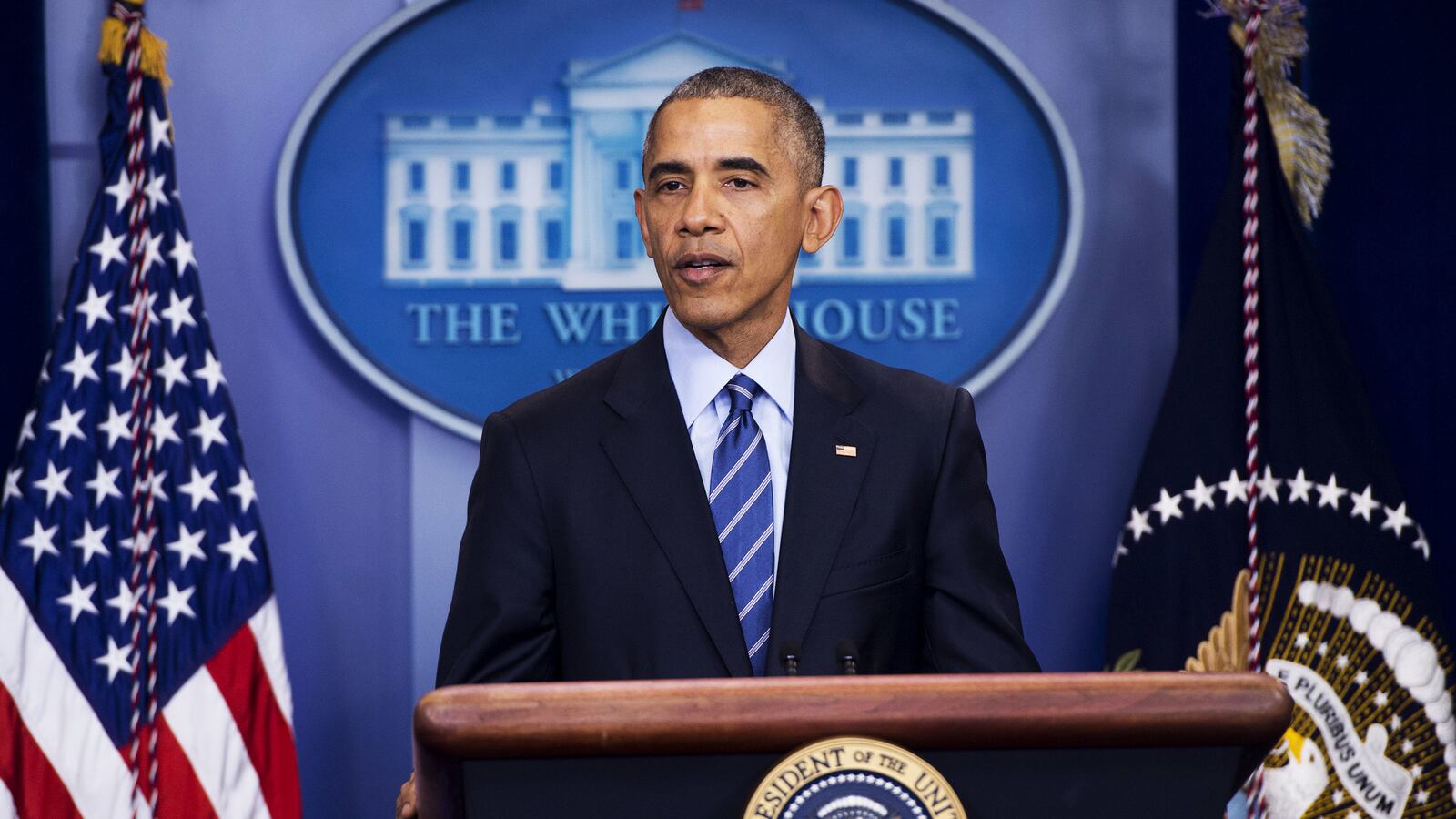Over one hour and twenty-six minutes, the longest press conference of his eight years, President Obama tried to tamp down some of the harsher rhetoric over Russian involvement in electing his successor.
Asked whether he was prepared to call out Russian President Vladimir Putin by name, he responded with a lengthy exposition of how the allegations first arose in early summer, how they were investigated and the findings briefed to members of Congress in October.
He defended his role and whether he had done enough to expose the hacking and respond to the Russians. He said he told Putin in September when they met briefly at a global summit in China to “cut it out” or face serious consequences, but by then the WikiLeaks hack had occurred, and the damage was done, an almost daily drip of embarrassing emails that undermined Hillary Clinton’s campaign.
Asked if he would “put your money where your mouth is” and de-classify the CIA findings that led to the agency’s high confidence of Russian culpability, Obama said he would provide evidence if it could be done safely and protect sources and methods. But he seemed irritated that this would be necessary. “Unless the American people genuinely think officials in the CIA, the FBI, the entire intelligence structure are less trustworthy than the Russians, people should pay attention to what our intelligence agencies say.”
Obama’s traditional end-of-the-year press conference took on a peevish tone as he excoriated the media for buying into a narrative shopped by GOP hardliners and the President-elect that Putin and Russia are riding high while Obama and America are in retreat. “Russia is a smaller country, a weaker country, its economy doesn’t produce anything anybody wants to buy except oil and gas, and maybe weapons. They don’t innovate. But they can impact us if we forget who we are, if we abandon our values.”
Obama is obviously irritated at some Washington pundits who have said that he should have blown the whistle louder and clearer on the Russians when information came to light about their hacking into the Democratic National Committee and Clinton campaign chairman John Podesta’s emails.
The President defended himself on that score, saying that in this hyper-partisan election, his primary concern was the integrity of the election. That’s why congressional leaders were briefed and the White House stayed silent.
“I wanted everyone to understand we were playing this thing straight,” he said. If he had spoken out, it would have been “one more political scrum.”
The apparent acceptance of Russian hacking among elected officials and the media stunned him.
“Folks who made a career of being anti-Russia didn’t say anything,” he said. After the election, they wanted to know, “Why didn’t you tell us?”
“C’mon,” he said, noting that in a recent poll over a third of Republican voters, 37 percent, approve of Putin. “Ronald Reagan would roll over in his grave.”
Obama must be relieved to be almost free of the burdens of office, interjecting at one point: “How many more days before I’m not a politician? 32—31—34?”
Yet, it also must be sinking in how much of what he has done can be undone by his successor. This was likely his last press conference, and he seemed reluctant to give up the microphone. This was Professor Obama at his best or worst, depending on your perspective.
Noting that everybody is acting surprised that the leaks disadvantaged Hillary Clinton, he exclaimed. “You guys wrote about it every day, including John Podesta’s risotto recipe. This was an obsession…” Secretary Clinton was not treated fairly during the election, he said. “The coverage of her and the issue was troubling.”
Obama endorsed the idea of a bipartisan commission to investigate Russian involvement in the election, but what they did was “not some elaborate espionage scheme.” They hacked into email accounts, and some were embarrassing and uncomfortable. Neera Tanden in a New York Times investigative piece about the hacking is quoted saying she just put her head in her hands, it was so demoralizing.
There was nothing really scandalous or disqualifying in the emails, but there were juicy tidbits. “And then it just took off, and that concerns me, and it should concern all of you,” Obama said to the media packed into the Brady Briefing Room, which was so crowded and hot that one woman fainted, briefly interrupting the press conference until she could be carried out.
The other issue putting Obama on the defensive is Syria. With the humanitarian crisis in Aleppo on the front pages, Obama was hard put to defend his policy. He said he had spent countless hours, and if it were tallied up, weeks and months, grappling with what to do in Syria.
He described looking at maps, hearing the military’s analysis, hearing from aid agencies. The answer was always the same. Short of putting large numbers of troops on the ground, uninvited and without any international mandate, there was no intervention they could find that was realistic, sustainable, and the right thing to do for America.
“I understand the impulse to want to do something,” he said, and the solution he chased for the last four years sought to engage international partners. “I can’t say that we have succeeded, and that’s something I have to go to bed with every night.”
Soon it will be President-elect Trump’s turn to put his money where his mouth is.






